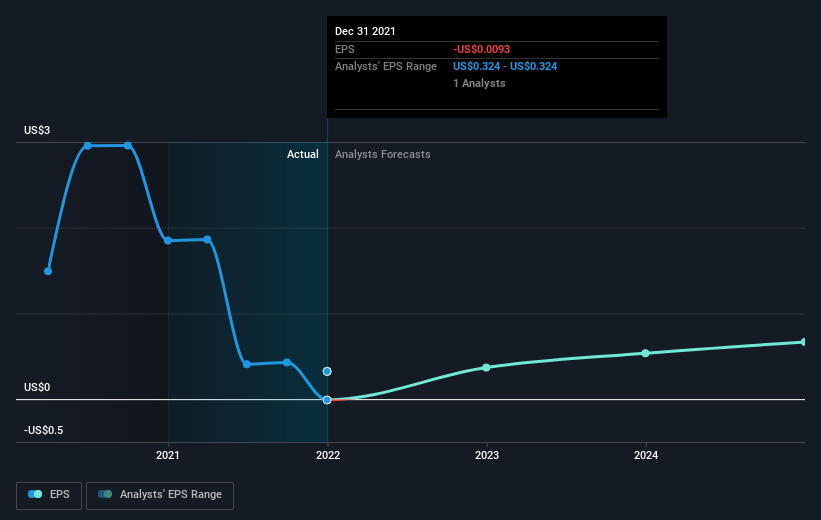Investors five-year losses grow to 1.3% as the stock sheds US$84m this past week
In order to justify the effort of selecting individual stocks, it's worth striving to beat the returns from a market index fund. But in any portfolio, there will be mixed results between individual stocks. So we wouldn't blame long term Piedmont Office Realty Trust, Inc. (NYSE:PDM) shareholders for doubting their decision to hold, with the stock down 23% over a half decade.
If the past week is anything to go by, investor sentiment for Piedmont Office Realty Trust isn't positive, so let's see if there's a mismatch between fundamentals and the share price.
View our latest analysis for Piedmont Office Realty Trust
To paraphrase Benjamin Graham: Over the short term the market is a voting machine, but over the long term it's a weighing machine. By comparing earnings per share (EPS) and share price changes over time, we can get a feel for how investor attitudes to a company have morphed over time.
In the last half decade Piedmont Office Realty Trust saw its share price fall as its EPS declined below zero. This was, in part, due to extraordinary items impacting earnings. Since the company has fallen to a loss making position, it's hard to compare the change in EPS with the share price change. However, we can say we'd expect to see a falling share price in this scenario.
You can see below how EPS has changed over time (discover the exact values by clicking on the image).
We consider it positive that insiders have made significant purchases in the last year. Having said that, most people consider earnings and revenue growth trends to be a more meaningful guide to the business. It might be well worthwhile taking a look at our free report on Piedmont Office Realty Trust's earnings, revenue and cash flow.
What About Dividends?
As well as measuring the share price return, investors should also consider the total shareholder return (TSR). The TSR is a return calculation that accounts for the value of cash dividends (assuming that any dividend received was reinvested) and the calculated value of any discounted capital raisings and spin-offs. So for companies that pay a generous dividend, the TSR is often a lot higher than the share price return. We note that for Piedmont Office Realty Trust the TSR over the last 5 years was -1.3%, which is better than the share price return mentioned above. This is largely a result of its dividend payments!
A Different Perspective
The total return of 7.6% received by Piedmont Office Realty Trust shareholders over the last year isn't far from the market return of -7.2%. So last year was actually even worse than the last five years, which cost shareholders 0.3% per year. It will probably take a substantial improvement in the fundamental performance for the company to reverse this trend. It's always interesting to track share price performance over the longer term. But to understand Piedmont Office Realty Trust better, we need to consider many other factors. For instance, we've identified 2 warning signs for Piedmont Office Realty Trust (1 is concerning) that you should be aware of.
There are plenty of other companies that have insiders buying up shares. You probably do not want to miss this free list of growing companies that insiders are buying.
Please note, the market returns quoted in this article reflect the market weighted average returns of stocks that currently trade on US exchanges.
Have feedback on this article? Concerned about the content? Get in touch with us directly. Alternatively, email editorial-team (at) simplywallst.com.
This article by Simply Wall St is general in nature. We provide commentary based on historical data and analyst forecasts only using an unbiased methodology and our articles are not intended to be financial advice. It does not constitute a recommendation to buy or sell any stock, and does not take account of your objectives, or your financial situation. We aim to bring you long-term focused analysis driven by fundamental data. Note that our analysis may not factor in the latest price-sensitive company announcements or qualitative material. Simply Wall St has no position in any stocks mentioned.

